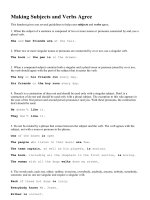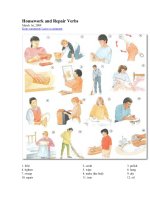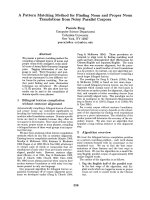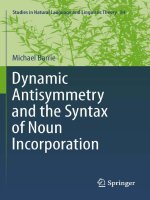Noun and verbs concord
Bạn đang xem bản rút gọn của tài liệu. Xem và tải ngay bản đầy đủ của tài liệu tại đây (62.8 KB, 32 trang )
<span class='text_page_counter'>(1)</span>Noun and verb concord (Sự hòa hợp giữa danh từ và động từ) Mr. Anh.
<span class='text_page_counter'>(2)</span> Thí dụ: John and Bill are roommates. John và Bill là hai đơn vị khác nhau nên ta dùng động từ ở số nhiều. Thí dụ: Bread and butter is delicious. Bánh mì trét bơ là một đơn vị nên động từ ở số ít. Thí dụ: Dutch and American beer are lighter than British. Dù beer là danh từ số ít không đếm được, nhưng câu trên có nghĩa Dutch beer and American beer nên động từ ở số nhiều..
<span class='text_page_counter'>(3)</span> Thí dụ: No teacher and no student is absent today. Every child and every adult has to take the medicine. Each boy and each girl is in uniform. Hai chủ ngữ số ít nối bởi AND, nhưng trưóc là EACH, EVERY, NO, động từ dùng ở số ít. Thí dụ: Many workers go to work on time. Many a worker goes to work on time. Sau MANY danh từ ở dạng số nhiều và đông từ ở dạng số nhiều. Sau MANY A danh từ ở dạng số ít và động từ ở dạng số ít..
<span class='text_page_counter'>(4)</span> Thí dụ:Two years is a long time to wait. Fifteen pounds is as much as I can give you. It is three kilometres to the station. Cụm danh từ số nhiều chỉ trọng lượng, giá trị, thời gian, chiều dài... mang tính cách đo lường phù hợp với động từ ở dạng số ít. Thí dụ: A number of students are absent today. The number of students is large. Sau A NUMBER OF danh từ ở dạng số nhiều và động từ ở dạng số nhiều. Sau THE NUMBER OF danh từ ở dạng số nhiều nhưng động từ ở dạng số ít..
<span class='text_page_counter'>(5)</span> Thí dụ: Three-fifths of the apple is spoiled. Three-fifths of the apples are spoiled. Sau phân số nếu danh từ ở dạng số ít, động từ ở dạng số ít; danh từ ở dạng số nhiều, động từ được sử dụng ở dạng số nhiều. Thí dụ: I, your teacher, command you. Tom, one of the excellent students, wins the star prize. Đông từ không phù hợp với từ đồng ngữ mà phù hợp với chủ ngữ ở trước..
<span class='text_page_counter'>(6)</span> Thí dụ: The complaint of the stundents is the many required subjects. Đông từ phù hợp với danh từ hạt nhân là COMPLAINT. Thí dụ: Tom with his friends goes to the cinema. The driver along with his passengers was rescued. This report together with the final exams completes my work of this term. The bus as well as the passengers was destroyed. Khi có các từ WITH, ALONG WITH, TOGETHER WITH, AS WELL AS, NO LESS THAN, INCLUDED WITH, IN ADDITION TO... ,động từ phù hợp với danh từ đi trước..
<span class='text_page_counter'>(7)</span> Thí dụ: Mary or her friends turn on the fan. Either you or I am wrong. Neither the students nor the teacher was seen in the class. Not only Kathy but also her friends were punished. Khi có các từ OR, EITHER ... OR, NEITHER ... NOR, NOT ONLY ... BUT ALSO... động từ phù hợp với danh từ đi sau..
<span class='text_page_counter'>(8)</span> Thí dụ: It was Mary and Ann. It is they who are wrong. Sau cấu trúc IT IS/ WAS ta có thể dùng danh từ số ít hoặc số nhiều. Thí dụ: Each answer is correct. Either letter is torn. Neither book is new. Danh từ số ít theo sau EACH, EITHER, NEITHER phù hợp với động từ số ít..
<span class='text_page_counter'>(9)</span> Thí dụ: Either of the answers is correct. Neither of the answers is (are) correct. Sau NEITHER OF là danh từ số nhiều, ta có thể dùng động từ ở dạng số ít hoặc số nhiều. Nhưng động từ ở dạng số ít chuẩn mực hơn. Thí dụ: None of the wine is sour. None of the pens is (are) expensive. Sau NONE OF danh từ ở số ít chi phối động từ số ít. Sau NONE OF danh từ ở số nhiều ta có thể dùng động từ số ít hoặc số nhiều, nhưng động từ số ít chuẩn mực hơn..
<span class='text_page_counter'>(10)</span> Thí dụ: Some/Half/Most of the salt is dirty. Some/Half/Most of the flowers are in bloom. Sau SOME/HALF/ MOST là danh từ không đếm được ta dùng động từ số ít. Nếu là danh từ đếm được ở số nhiều ta dùng động từ ở dạng số nhiều. Thí dụ: My family is happy. My family go to work and to school in the morning. Danh từ tập hợp có nghĩa toàn thể (as a whole) ta dùng động từ số ít; có nghĩa từng thành viên (member) ta dùng động từ số nhiều..
<span class='text_page_counter'>(11)</span> Thí dụ: Mathematics is difficult. Mumps makes him miserable. Danh từ có dạng số nhiều nhưng nghĩa số ít ta dùng động từ số ít. Thí dụ: There is a book and three notebooks on the table. There are three notebooks and a book on the table. Chỉ danh từ đầu tiên chi phối số ít hoặc số nhiều..
<span class='text_page_counter'>(12)</span> Thí dụ: One of the students who are in our class is good at playing the guitar. Động từ trong mệnh đề quan hệ bị chi phối bởi danh từ ở ngay trước các đại từ quan hệ (WHO, WHOM, WHICH, THAT, WHOSE). Động từ trong mệnh đề chính (IS) bị chi phối bởi danh từ ở đầu câu (one). Thí dụ: People were cheering wildly. The police are looking for three men in the mountain. PEOPLE, POLICE, PUBLIC, CLERGY, CATTLE, POULTRY ... có ý nghiã số nhiều và đòi hỏi động từ ở số nhiều..
<span class='text_page_counter'>(13)</span> Thí dụ: To learn English is not easy. Swimming is good for health. What you say is wrong. Cụm động từ nguyên mẫu, danh động từ và mệnh đề chi phối động từ số ít. Thí dụ: The poor are often miserable. The good in him overweighs the bad. Tính từ được dùng như danh từ chỉ người chi phối động từ số nhiều. Tính từ dùng như danh từ chỉ vật chi phối động từ số ít..
<span class='text_page_counter'>(14)</span> Choose the correct form of the verb in the following sentences. 1. Neither he nor I (am / is) going to the party tomorrow. 2. Yesterday all the money in the drawer (was / were) stolen, and the police (have/ has) been investigating everybody. 3. A pair of jeans (was / were) on the sewing-machine this morning. 4. The police (have / has) been looking for the escaped prisoner for a month. 5. Each child (is / are) given some lucky money on New Year Day..
<span class='text_page_counter'>(15)</span> 6. Most of the cats (are /is) afraid of dogs. 7. The headmaster as well as all the teachers (is / are) in charge of training and protecting their students. 8. The house with its four windows (is/are) broken. 9. The committee (has/ have) passed the decision on building a new bridge connecting Vinh Long and Can Tho provinces. 10. A number of bugs (is / are) biting him in bed, which makes him very miserable..
<span class='text_page_counter'>(16)</span> 11. Every man and woman (has / have) the right to vote. 12. The crowd at the meeting (was / were) cheering wildly when Lady Diana appeared. 13. The strong (is / are) to protect the weak in case of danger. 14. One-third of the house (was /were) destroyed in the fire. 15. Physics (is /are) difficult but interesting to learn..
<span class='text_page_counter'>(17)</span> 16. Not only the students but also the teacher (was / were) blamed due to the noise. 17. The number of the teenagers committing crimes (have /has) increased recently in the United States. 18. At court, the jury (was /were) listening to the witness who had seen the crime by accident. 19. Five-eighths of the trees on the pavements (is / are) not looked after regularly. 20. There (was /were) a family including ten people living on the huge pile of rubbish day after day..
<span class='text_page_counter'>(18)</span> Subject and Verb Agreement Exercise Choose the correct form of the verb that agrees with the subject. 1. Annie and her brothers (is, are) at school. 2. Either my mother or my father (is, are) coming to the meeting. 3. The dog or the cats (is, are) outside. 4. Either my shoes or your coat (is, are) always on the floor. 5. George and Tamara (doesn't, don't) want to see that movie..
<span class='text_page_counter'>(19)</span> 6. Benito (doesn't, don't) know the answer. 7. One of my sisters (is, are) going on a trip to France. 8. The man with all the birds (live, lives) on my street. 9. The movie, including all the previews, (take, takes) about two hours to watch. 10. The players, as well as the captain, (want, wants) to win. 11. Either answer (is, are) acceptable. 12. Every one of those books (is, are) fiction. 13. Nobody (know, knows) the trouble I've seen. 14. (Is, Are) the news on at five or six?.
<span class='text_page_counter'>(20)</span> 15. Mathematics (is, are) John's favorite subject, while Civics (is, are) Andrea's favorite subject. 16. Eight dollars (is, are) the price of a movie these days. 17. (Is, Are) the tweezers in this drawer? 18. Your pants (is, are) at the cleaner's. 19. There (was, were) fifteen candies in that bag. Now there (is, are) only one left! 20. The committee (debates, debate) these questions carefully..
<span class='text_page_counter'>(21)</span> Circle the correct verb in each of the sentences below. 1.Your friend (talk-talks) too much. 2.The man with the roses (look-looks) like your brother. 3.The women in the pool (swim-swims) well. 4.Bill (drive-drives) a cab. 5. The football players (run-runs) five miles every day..
<span class='text_page_counter'>(22)</span> 6. That red-haired lady in the fur hat (live-lives) across the street. 7. He (cook-cooks) dinner for his family. 8. The boys (walk-walks) to school every day. 9. The weather on the coast (appear-appears) to be good this weekend. 10. The center on the basketball team (bouncebounces) the ball too high..
<span class='text_page_counter'>(23)</span> Circle the correct verb in the sentences below. 1. Each of the girls (look-looks) good on skis. 2. Everybody (was-were) asked to remain quiet. 3. Neither of the men (is-are) here yet. 4. (Is-Are) each of the girls ready to leave? 5. Several of the sheep (is-are) sick. 6. Some members of the faculty (is-are) present. 7. Nobody in the class (has-have) the answer. 8. Each of the girls (observe-observes) all the regulations. 9. All of the milk (is-are) gone. 10. Most of the seats (was-were) taken..
<span class='text_page_counter'>(24)</span> Circle the correct verb in each of the sentences below. 1. Mumps (is-are) one of the most uncomfortable diseases. 2. One hundred dollars (is-are) not a lot of money to some people. 3. She (doesn’t-don’t) look very well today. 4. Twenty minutes (is-are) the amount of time it takes me to get home from work. 5.It (doesn’t-don’t) seem so cold today..
<span class='text_page_counter'>(25)</span> 6. 7. 8. 9.. Gymnastics (is-are) easy for Angela. Interesting news (is-are) what sells our paper. A pound of cookies (cost-costs) about a dollar. They (doesn’t-don’t) think they’ll win the game tonight. 10. He (don’t-doesn’t) speak very well..
<span class='text_page_counter'>(26)</span> Write the correct verb in the blank to the left of each sentence. See the instructor for answers. 1. Everybody (was-were) asked to be quiet. 2. In a marathon, few of the starters (finishesfinish) the race. 3. Sixty days (is-are) not enough time to complete the project. 4. All of the workers (is-are) receiving their bonus. 5. On our street (is-are) many tall trees..
<span class='text_page_counter'>(27)</span> 6. 7.. It (don’t-doesn’t) make any difference. The value of cars and motorcycles (has-have) increased. 8. The principal and her husband (is-are) honored guests. 9. Either the pitcher or the base runners (waswere) caught napping. 10. One of my friends (believe-believes) in E.S.P..
<span class='text_page_counter'>(28)</span> 11. Have you ever heard the expression, “No news (is-are) good news?” 12. There (was-were) several dents in the car. 13. Louise (doesn’t-don’t) want to drive that long distance. 14. Either Luis or Horace (pay-pays) the bills in our house. 15. A boy and a girl (were-was) here to see you..
<span class='text_page_counter'>(29)</span> 16. The box of apples (is-are) on the porch. 17. Some of the job applicants (is-are) expected to pass the difficult screening test. 18. The army (is-are) conducting maneuvers in March. 19. Here (come-comes) the family now. 20. Neither of us (is-are) going to work..
<span class='text_page_counter'>(30)</span> 21. (Doesn’t-Don’t) they know when to quit? 22. Thirty minutes (is-are) the time limit for the test. 23. Measles (is-are) a disease most children experience. 24. The class (is-are) turning in their registration forms today. 25.Beyond the mountains (is-are) a fertile valley..
<span class='text_page_counter'>(31)</span> 26. Mary together with her classmates (is/are) waiting for the bus. 27. Either the car or the bikes (was/were) smashed 28. Politics (is/are) not his favorite subject. 29. The students as well as their teacher (look/ looks) very happy. 30. Economics (make/makes) him sad..
<span class='text_page_counter'>(32)</span> Circle the correct verb in each of the sentences below. 1. On the bottles (lie/lies) a drunk man. 2. Two-thirds of the net (was/were) burnt. 3. The chicken and vermicelli (look/looks) delicious 4. The cake and cream (make/makes) him hungry. 5. Not only the boat but also the fishermen (was/ were) rescued..
<span class='text_page_counter'>(33)</span>









